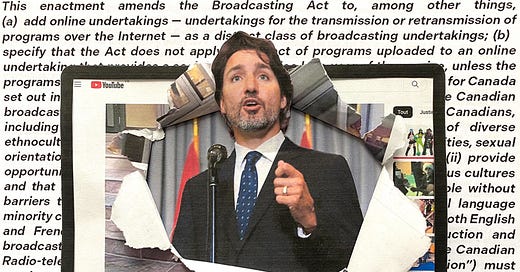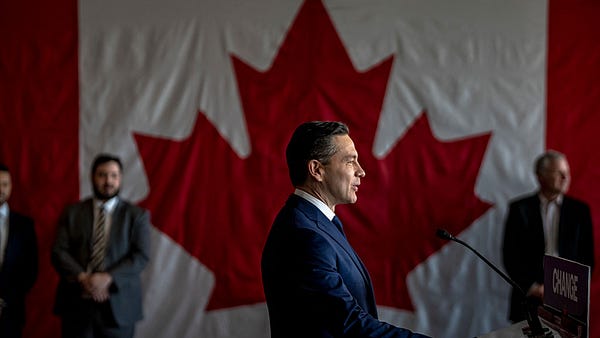
The Free Press

In January 2007, Justin Bieber’s mom, Pattie Mallette, posted a video of her son, then 12, covering R&B star Ne-Yo’s “So Sick” at a kids’ singing competition in a little town near Toronto.
“I told him, ‘Okay, you’ve never sung in front of anybody before, and you’ve never had singing lessons,’” Mallette told me. ‘Let’s adjust our expectations.’ ” Bieber finished third. “One of the judges actually left because she was upset that he didn’t come first,” Mallette said.
Encouraged by his strong performance, Mallette started posting more videos on YouTube—mostly so Bieber’s grandmother could see him—and soon he had a fan base, and that blew up, and, well, here we are 70 million albums, $485 million, and two Grammys later.
“It all happened organically,” Mallette said.
Canada’s Online Streaming Act, or Bill C-11—which is now being debated in Parliament and would make online streaming services prioritize Canadian content the same way Canada’s television and radio stations are regulated—would curtail that kind of organic growth, sharply limiting the rise of future Biebers.
“I believe in God,” Mallette said, “and I think that if it’s His will for him to be known worldwide, then He would have found a way to make that happen. But I don’t know that YouTube would have been the vehicle that would have been used.”
Canada’s Liberals insist the point of Bill C-11 is simply to update the 1991 Broadcasting Act, which regulates broadcasting of telecommunications in the country. The goal of the bill, according to a Ministry of Canadian Heritage statement, is to bring “online broadcasters under similar rules and regulations as our traditional broadcasters.”
In other words, streaming services and social media, like traditional television and radio stations, would have to ensure that at least 35 percent of the content they publish is Canadian content—or, in Canadian government speak, “Cancon.”
The bill is inching toward a final vote in the Canadian Senate as soon as next month. It’s expected to pass. If it does, YouTube CEO Neal Mohan said in an October blog post, the same creators the government says it wants to help will, in fact, be hurt.
Bill C-11, Mohan explained, would mean “that when viewers come to the YouTube homepage, they’re served content that a Canadian Government regulator has prioritized, rather than content they are interested in.”
That doesn’t bode well for creators, he said.
That’s because users often give a thumbs-down to content that the algorithm steers them toward and that they don’t want to watch—and that leads the Search and Discovery systems at YouTube to limit visibility of that content. “[G]lobally,” Mohan said in his post, “Canadian creators will have a harder time breaking through and connecting with the niche audiences who would actually love their content.” (According to Mohan, more than 90 percent of the “watch time” on content produced by Canadian YouTubers comes from outside Canada.)
Bottom line: had Bill C-11 been the law of the land back in early 2007, Justin Bieber would probably have encountered more Canadian viewers who didn’t want to watch him, many would have given him a thumbs-down, and YouTube would have limited the number of viewers who ultimately saw him.
Meaning no My World 2.0. No “Ghost.” No Beliebers. (Try imagining a world without any Beliebers.)
Meddling with the algorithm, Canadian officials claim, is meant to create more—not fewer—superstars. The Heritage Ministry’s statement said Bill C-11 would “ensure that online streaming services showcase Canadian music and stories.” The Minister of Canadian Heritage, Pablo Rodriguez, for his part, said the goal is to “protect the future of our culture as Canadians.”
But the most prominent people and organizations behind Bill C-11 are, for the most part, unwilling to defend it publicly.
I contacted the Writers Guild of Canada; Friends of Canadian Broadcasting; Peter Harder, a senator and former deputy foreign affairs minister; Pablo Rodriguez; and Prime Minister Justin Trudeau—all of whom want to see Bill C-11 become law. No one felt obliged to explain why the 29.1 million Canadians expected to stream video content this year need a little nudge to make sure Canadian culture isn’t diluted by “foreign online companies,” as Bill Skolnik, copresident of the Coalition for the Diversity of Cultural Expressions, put it.
If you’re confused by all this—if you’re wondering why the Liberal Party and its allies in these quasi-governmental organizations are suddenly so worried about Canada’s national identity—that’s understandable.
In a 2015 interview with The New York Times, Trudeau proudly declared, “There is no core identity, no mainstream in Canada.” Canada, he explained, is “the first postnational state.” The authorized, two-volume biography of Trudeau’s father, former prime minister Pierre Trudeau, is called Citizen of the World. Pablo Rodriguez maintains dual citizenship—in Canada and in Argentina, where he was born.
So why is Trudeau, of all people, championing this legislation? There’s an easy explanation—and it has nothing to do with borders or culture.
“Bill C-11 is a government censorship bill masquerading as a Canadian culture bill,” Jay Goldberg, a director at the conservative Canadian Taxpayers Federation, told me. Referring to the Canadian Radio-television and Telecommunications Commission, Goldberg said, “The government is intending to give the power to the CRTC to be able to filter what we see in our news feeds, what we see in our streaming feeds, what we see on social media.”
Supporters of Bill C-11 emphasize it would affect only YouTube, Netflix, Amazon, TikTok, and other Big Tech platforms; the Heritage Ministry statement notes “the bill does not apply to individual Canadians.” But the language is so vague that it’s unclear how it would actually be implemented.
For example, it would be up to CRTC regulators to decide what constitutes “Canadian” content. The singer The Weeknd was born in Toronto but now mostly lives in Los Angeles. Does he still count as Canadian? What about rock n’ roller Bryan Adams, who was born in Kingston, Ontario, and spends a great deal of time in Europe?
Jordan Peterson, the psychologist and social media phenomenon (Peterson has 6.5 million YouTube subscribers and over 4 million Twitter followers), told me Bill C-11 is “going to open the door for an unbelievable amount of behind-the-scenes invisible meddling in the prioritization of Canadian searches.”
As it turns out, Conservative senator Leo Housakos told me, it’s not Canadian creators who need a boost—it’s Canada’s sclerotic legacy media. Bill C-11, he said, is meant to protect the likes of the Canadian Broadcasting Corporation and conglomerates like Bell Media and Quebecor, all of which can be counted on to toe the Liberal Party line.
That certainly seems to be what the bill’s boosters are indicating. In an April 2022 post, Valerie Creighton, president of the Canada Media Fund, created by Canada’s Ministry of Heritage, appeared to agree with Housakos about the need for shielding legacy media from market forces. Creighton seemed to echo Pablo Rodriguez, who had noted a few weeks earlier that 450 Canadian media outlets had closed over the previous 13 years.
“The entry of the streamers and platforms into the Canadian market has resulted in aggressive competitive pressure on the Canadian broadcast and distribution system,” Creighton said in her post. “Our companies cannot compete with the deep financial resources and wide distribution these platforms offer.”
It is not an accident that Bill C-11 coincides with Bill C-18, a proposed new law that would require big platforms like Facebook and Google to pay Canadian news organizations for content that appears on the tech platforms. Bill C-18 is expected to become law by summer. American trade associations urged President Biden, during his visit last week to Ottawa, to voice concerns about both bills to Trudeau.
These two bills are of a piece with an illiberal tide that has swept the West over the past decade and has found fertile ground in Canada under a prime minister who has, again and again, shown contempt for those who do not share his worldview.
Case in point: Trudeau’s response to the truckers who descended on Ottawa in early 2022. The truckers, or Freedom Convoy, were protesting what they considered onerous Covid vaccine mandates. Trudeau refused to meet with them, suggesting the 8,000 to 10,000 protesters—whom I reported on for The Free Press—were neo-Nazis and “an insult to memory and truth.” In the case of the truckers, many were tossed off payment apps like PayPal, or “debanked.” In the case of content creators whose politics don’t align with the government’s, they worry about being sidelined.
“The probability that the Canadian government is going to help disseminate my content to the world is zero,” Jordan Peterson told me. “There isn’t a chance that they’ll do that. Because, obviously, I’m not ideologically aligned or philosophically aligned or morally aligned with anything that the Liberals or bureaucrats for that matter do.”
This unwillingness to engage with the opposition—to take part in the messy, cantankerous democratic process, to make room for more voices, to entertain more ideas and arguments and counterarguments—has left many old-fashioned Canadian Liberals dismayed.
In a January 31 speech invoking the Roman thinker Cicero and the Soviet writer Vasily Grossman, Liberal senator and award-winning author David Richards lashed out at Bill C-11: “We have lately become a land of scapegoaters and finger pointers, offering accusations and shame while believing we are a woke society. . . . what George Orwell says we must resist is a prison of self-censorship. This bill goes a long way to construct such a prison.”
Margaret Atwood, the acclaimed author of The Handmaid’s Tale, tweeted her support of Richards’ speech: “Needs a listen.”
Pattie Mallette was similarly put off by the government trying to steer its citizens, the people who were supposedly in charge, in the “correct” direction. Referring to Bill C-11, she said: “I feel like it’s almost an insult. It’s like Canadians don’t make good enough content for people to see, so we have to create a handicap to make sure that people are seeing your content.”
Rupa Subramanya is a reporter for The Free Press. Her last story, “The ‘Giant Grift’ That Swallowed Wall Street—And Maybe Your Savings,” took a hard look at ESG and its discontents. You can read it here.
To support our work, join The Free Press community today:


















Trudeau’s father, former prime minister Pierre Trudeau, HAHAHAHA.
Sounds like Canada wants to create a tariff on content. I live near enough to Canada to hear their public radio station on my fm radio. I stopped listening when I’d had enough ‘Canadian’ only content. It was really weird to only hear Canadian artists and authors interviewed - like the rest of the world didn’t exist. Seems that Canada is already there, so why another law to bound the internet ?